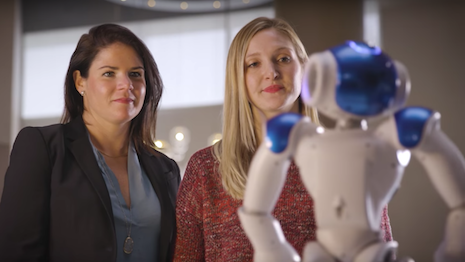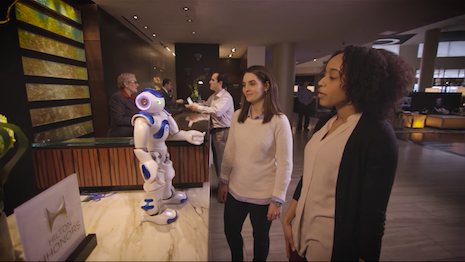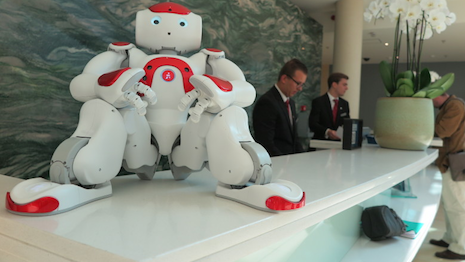- About
- Subscribe Now
- New York,
March 28, 2017

 Yumeko robot checks in guests at Japan's Henn na Hotel. Image credit: Henn na Hotel
Yumeko robot checks in guests at Japan's Henn na Hotel. Image credit: Henn na Hotel
By Ana Andjelic
Exceptional personal service has always distinguished great hospitality brands from merely good ones. A number of studies have shown that customers satisfied with service buy more – and more often – and they also spread the word to their friends.
Now, social media, personal assistants and instant messaging make intuitive, quick and seamless personal service more important than ever.
The challenge is how to scale it.
AI on the ball
Enter artificial intelligence (AI).
Smart companies are already experimenting with uses of AI to gather intelligence about their guests, manage their revenue and predictive maintenance, automate their data entry and analysis, and deliver effortless, one-step-ahead-of-you personal service to their customers.
It may sound strange that this anticipatory personal service can possibly involve anything but a well-trained human.
After all, the golden standard of great hospitality is the Japanese principle of motenashi: being intuitive, effortless and flexible.
Intuition, flexibility and empathy are uniquely human characteristics. We are unpredictable, emotionally nuanced and complex, and we require equally emotionally complex beings to understand us.
At the same time, left to our own emotional and cognitive devices, we can only do so much.
Artificial intelligence helps us become super-humans. Thanks to it, we can crunch limitless data in matter of seconds, combine disparate and complex information sources and connect the dots and recognize patterns in ways unheard of before.
 Hilton and IBM pilot Connie, the world's first Watson-enabled hotel concierge. Image credits: Hilton and IBM
Hilton and IBM pilot Connie, the world's first Watson-enabled hotel concierge. Image credits: Hilton and IBM
The end game of using AI in hospitality is not to remove humans from the equation.
The role of AI, noted Danny Mayer, famous restaurateur behind New York’s Union Square Hospitality Group and author of customer-care playbook “Setting the Table” is to “empower human beings who actually have a beating heart and who are caring people to achieve a greater degree of hospitality.”
Mr. Mayer knows what he is talking about.
At his restaurant in New York’s Union Square, Mr. Mayer’s managers and sommeliers are using AI to deliver more seamless, intuitive service.
“There is a gentle ping that could go from the manager to the front desk to say table 62 is ready,” describes this restaurateur. “Or when a waiter places an order for a bottle of wine, the sommelier, who is wearing an Apple Watch, gets a ping and can bring you that bottle and save eight minutes.
“[Our] system can say table 42 has just paid their bill, and they can ping the coat checker and have your coats ready for you at the front door so you can be off. The bottom line of all this is, can we give back the gift of time?”
Chat on bot
Consensus among those working with AI is that its role is to amplify and augment, not replace, humans.
MIT Media Lab director Joi Ito noted that “humans are really good at things computers are not.” And vice versa.
Finding, organizing, recognizing patters and providing accurate data are AI’s advantages. The combination of the two gives hospitality immense opportunity to provide fast, consistent, seamless and personal service at scale.
Like every other technology, AI is at its best when it is invisible.
Every time guests get to see the evidence of AI at work, the execution is flawed.
How flawed exactly this execution can be is vividly illustrated in Facebook M personal assistant’s failure rate.
A whooping 70 percent of Facebook’s AI bot interactions end in a communication breakdown or demand a human to overcome a hurdle.
In this, Facebook is not alone.
Forrester Research claims that most bots currently in use are not ready to deal with complexities of human conversation, and require human oversight to succeed.
AI conversations make sense only if they feel more – and not less – natural than scrolling through a, say, FAQ sheet.
For this natural (read: human) feel to happen, we need a combination of humans and technologies such as natural language processing, AI and machine learning.
Leaving us completely in the hands of robots is probably not a good idea (think Terminator). It is also costly.
A good rule of thumb when deciding how to invest in AI is to ask whether technology can provide information or operation that a human cannot.
Yumeko of the Henn na Hotel in Sasebo in the Japanese prefecture of Nagasaki, is a human-like robot that is accompanied with two velociraptor dinosaurs at the check-in counter. Her job is to greet guests and while she may look like a human, she misses a human touch, and is more likely to attract tech-geeks than luxury-seeks.
 Velociraptor dinosaurs at Henn na check-in. Image credit: Henn na Hotel
Velociraptor dinosaurs at Henn na check-in. Image credit: Henn na Hotel
Connie is Virginia’s Hilton McLean IBM Watson-powered robot who informs guests on local tourist attractions, makes restaurant recommendations and offers lowdown on hotel features and amenities.
Once the novelty of interacting with a robot wears off, Hilton will be forced to deal with the actual hospitality value that Connie brings to its guests.
 Connie at the Hilton Hotel in McLean, Virginia. Image credits: Hilton and IBM
Connie at the Hilton Hotel in McLean, Virginia. Image credits: Hilton and IBM
Aloft Cupertino in Cupertino, CA, has its own Boltr robot that runs errands and delivers toothpaste to guests’ rooms, and gets tipped in tweets. It is undoubtedly fun to see a robot running around a hotel, but again, is this something that a human can do? If the answer is yes, go back to your whiteboard and rethink what your best AI investment is.
Hilton's Connie taps IBM technology
Compared to these efforts, the Marriott Hotel in Ghent, Belgium, deploys Mario.
Mario speaks 19 languages and is responsible for checking the rooms and welcoming visitors. It can be a nice touch to be greeted in your own language, and there may not be enough international hospitality staff in Ghent.
 Mario from the Marriott Hotel, Ghent, Belgium. Image credit: Marriott Hotels
Mario from the Marriott Hotel, Ghent, Belgium. Image credit: Marriott Hotels
Super Mario to the rescue of hotel guests
It’s elementary, Watson
Good uses of AI add value to human experience. They are seamless, effortless and adaptable.
Travel company Thompson is working with IBM’s Watson on a smart chatbot for its customers’ holiday searches. The plan is for AI to increase loyalty by helping hoteliers learn more about their guests to better serve them and drive repeat visits.
Kayak co-founder Paul English launched travel planning application Lola last year, combining a live staff of travel agents with AI-augmented chat functionality.
“We are trying to create superhuman travel consultants who are AI-powered and can handle more trips per hour than a regular travel agent can,” Mr. English told travel news site Skift.
Lola combines human strengths with machine-learning algorithms that teach its AI to give ever-more relevant answers in the future.
Dorchester Collection partnered with RicheyTX to develop Metis, an AI platform that by crunching countless data lets this hotel chain discover that breakfast is not merely an expectation for its guests, but something on which they place huge importance.
In response, Dorchester Collection invested more in personalizing and augmenting the breakfast experience.
Personal travel assistant, concierge and bot Mezi, which raised $9 million in 2016, uses AI to comb through a number of search engines for travel information, and customizes travel suggestions based on past searches, conversational tone and other online habits.
If a traveler previously displays a preference for boutique hotels near restaurants, the app will prioritize its suggestions to fit a traveler’s needs.
Manually entered, the sort of database that Mezi uses can feature only a single-digit number of preferences per guest. Automatically entered and managed, the number of preferences is infinite.
The Ritz-Carlton Hotel Co. created its Mystique system exactly to that end.
“Whenever we discover or are alerted to a guest’s preferences, we put them into Mystique, and Mystique talks to all the properties within Ritz-Carlton. As a guest, you can go from Ritz-Carlton to Ritz-Carlton around the world, and we will know and be able to deliver what you like,” Diana Oreck, vice president of The Ritz-Carlton Leadership Center, told Forbes.
“We use Mystique to increase a guest’s sense of wonder, with little things delivered unexpectedly,” she said.
Consistency of service and personalization are examples of good uses of AI. Seamlessness is another.
Starwood’s “Project Jetson” pilots Siri-activated rooms, and Aloft Cupertino is looking to implement smart mirrors, smart carpets and AI-powered thermostat systems.
The Henn na Hotel in Japan allows guests to open doors by using facial recognition software or control lights through verbal cues.
The Hyatt Regency Riverfront in Jacksonville, FL, uses AI to better generate staffing schedules and forecast guests’ needs.
The Pan Pacific in San Francisco was able to achieve highly accurate restaurant, room service and banquet forecasting, as well maintain appropriate staffing levels.
Machine learning in the true sense
IN HOSPITALITY, white-glove, human touch makes us feel special and looked after.
We remember times when we were surprised and delighted by thoughtful, empathetic and anticipatory service. We tell others about it. We keep coming back to places where we experienced it.
Motenashi of the future is a combination of AI and humans, each doing what they do best.
AI is all about fast, accurate and predictive data.
Humans are about the empathetic and intuitive interpersonal contact.
Working together, they are able to deliver the best possible service at scale.
 Ana Andjelic
Ana Andjelic
Ana Andjelic is senior vice president and global strategy director at Havas LuxHub, New York. Reach her at ana.andjelic@havasluxhub.com.
Share your thoughts. Click here